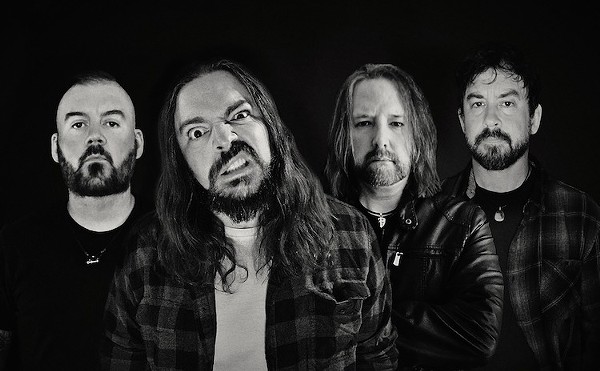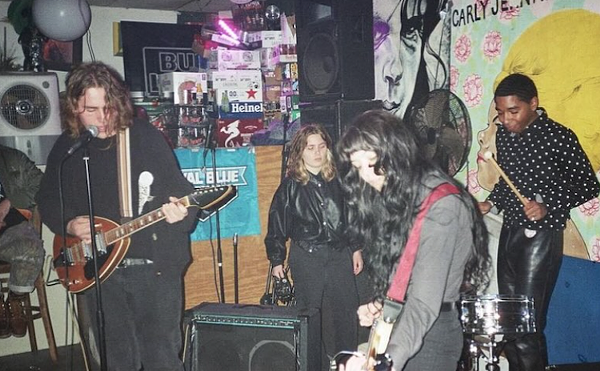Released in October 1986, Slayer's Reign in Blood has earned numerous retrospective accolades. Earlier this year, Metal Hammer magazine named it the best metal album of the past two decades, while the October issue of Guitar World places it 29th among guitar albums. However, Reign in Blood's status transcends lists, because lists chronicle mortal creations. Much as most historians disqualify Jesus when discussing great men, so should musicologists isolate Reign in Blood, the aural distillation of Christ's aesthetic antithesis. These 10 tracks comprise the perfect descent; there will be no second coming.
Reign in Blood appreciates in value as years pass because it represented such profound progress that its innovations lacked context. Slayer fused hardcore-punk drumbeats, serrated guitar solos and searingly inflammatory lyrics into an unprecedented machine. While other cavemen tinkered with wheels and fire, Slayer assembled a stealth aircraft. Other bands followed the blueprint, building the equivalent of model planes — impressive, on a much smaller scale.
In 1986, it seemed entirely possible that groups would keep testing the heaviness threshold, but such projections now seem as naively optimistic as 1950s sketches of rocket cars. While other albums, including some subsequent Slayer records, are faster and more graphic, surpassing Reign's peak levels only results in diminishing returns.
Countless outfits, notably Nile and Cryptopsy, shred Slayer's beats-per-minute record, but their outrageous pacing relegates them to esoteric extremism. Slayer, with Dave Lombardo behind the kit, never exceeded the maximum speed at which an average headbanger could drum his fingers on a table in time with the beat.
Lyrically, Cannibal Corpse and Exhumed out-gore Reign's content, to the point that they become outlandish caricatures of malevolence. Also, the fact that their vocalists eschew enunciation forces listeners to consult the lyrics sheet for any actual understanding of their baroque grotesqueries. Reading along with songs is like having a joke explained: It dilutes the potency. By contrast, Slayer singer Tom Araya's inimitable syllable-spitting delivery wrings maximum menace out of his lines.
Reign's opening track about Nazi physician Josef Mengele ("Angel of Death"), caused controversy, despite its commonsense stance. Rather than glamorizing its subject, the song, written by guitarist Jeff Hanneman, condemns him as an "infamous butcher." Yet with its savage riffs and Araya shrieks, "Angel of Death" sounds like an active endorsement of sadistic torture rather than a documentary acknowledging that it occurred. Slayer inhabits its loathsome characters so convincingly that countless listeners believed the Hispanic Araya advocated genocide "to benefit the Aryan race."
Slayer employs a considerably more incendiary strategy on "Jihad," a terrorist's-point-of-view Sept. 11—themed track from this year's Christ Illusion. After Araya howls, "Let the pillars fall," he recites lines from an al-Qaeda training manual. The group has likened "Jihad" to "Angel of Death," claiming both are nonjudgmental looks at widely decried atrocities, but this time it's easy to see the sweat stains as Slayer strains for shock value.
Ostentatiously Satanic when it surfaced with Show No Mercy and Hell Awaits, Slayer let its musically severity speak for itself on Reign in Blood. "Jesus Saves" flouts Christianity and "Piece by Piece" depicts cannibalism, but guitarist/main lyricist Kerry King does so with an eloquence that eluded Venom, its primary predecessor. With a pulp novelist's knack for pungent description, King gave blood-splattered metal literary cred.
Instead of replicating its masterpiece, the group pursued a different direction with 1988's doom-tinged South of Heaven, which featured a response to the "Angel of Death" criticism ("Behind the Crooked Cross") and an anti-abortion rant ("Silent Scream"). 1990's Seasons in the Abyss and 1994's Divine Intervention alternated moody epics (such as both title tracks) with Reign-style thrashers, maintaining a high caliber of quality.
Unfortunately, 1996's covers album Undisputed Attitude signaled the start of a derivative decade. 1998's Diabolus in Musica plodded unflatteringly and God Hates Us All proved even an economy-sized drill can't break new ground when it's positioned in an already established hole. The album's Sept. 11, 2001, release date instantly rendered it quaint, its impaled-Bible cover going unprotested in the face of real grief and fear.
"It's fast, heavy, and maybe faster than anything we've done before," Araya offered eagerly in a press release interview about Christ Illusion, his redundancy foreshadowing the record's retread riffs. Technically, his assertion rings true — Lombardo pounds with feral ferocity — but it's ultimately irrelevant, because Christ Illusion speeds toward nowhere.
Nonetheless, Slayer's ill-fated attempts to recapture Reign's fire do nothing to diminish the groundbreaking album's primacy. To paraphrase a philosophical koan, the record is the theoretical boulder so heavy that even the creator can't lift it.
[email protected]

















